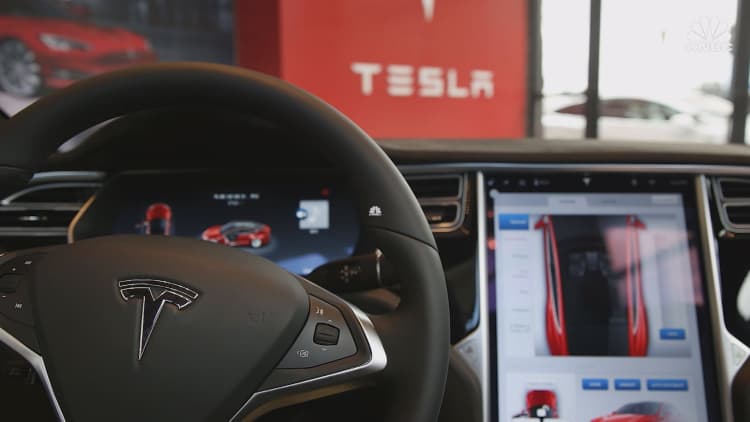
Elon Musk's stunning announcement that he is looking to take his pioneering car company private could have darker implications for the broader market.
Myriad questions surround the Tesla founder's cryptic tweets earlier this week that he has financing in place to remove the company from the public sphere in a deal he's valuing at $420 a share. Not the least of the issues is whether Musk violated securities laws by announcing the deal over Twitter.
However, if there is a legitimate buyer or buyers out there, such a move would raise the specter of what one analyst calls a "Tesla top": a pinnacle in business risk-taking that signals a tipping point for corporate America.
"While we are not superstitious by nature, we do fear this transaction looks an awful lot like other deals done at the peak of prior cycles," Nick Colas, co-founder of DataTrek Research, wrote in his daily note sent out Thursday.
He compared the potential Tesla move to RJR Nabisco's take-private in 1988, AOL's purchase of Time Warner in 2000 and even Goldman Sachs' bundling of toxic mortgages in 2007 that investor John Paulson bet against and turned into one of the most lucrative trades of all time.
Colas figures that it would take $57 billion to get the Tesla deal done, most likely through venture capital. A deal of that size could suggest that VC firms have gotten overzealous in their determination to put cash to work, and that investors have fallen too deeply in love with disruptor companies like Tesla, which makes electric cars and whose founder is determined to break down the barriers to space travel.
"Is all that a sign to sell everything?" Colas wrote. "Obviously not, but it bears watching especially if this deal actually goes through."
The Musk move comes amid a turbulent year for markets, which have been shaken by everything from presidential tweets to valuation and inflation scares. Tesla shares have been volatile since the Tuesday tweets, rising sharply at first then giving back some of those gains Wednesday.
This indeed has been a dizzying year for venture capital, and it wouldn't be a shock to see some ambitious investor looking to do a massive deal.
In the second quarter alone, VC firms announced 3,686 deals worth $74 billion, another record for an industry that has continued to scale new heights, according to Preqin, which tracks institutional fund flows and deal activity.
If it is indeed a VC firm behind the Tesla deal, that would take the industry's footprint to a whole new level and spark concerns about broader implications.
"VCs are so flush with cash that they desperately need companies like Tesla — large, scalable, and levered to mega-trends like autonomous driving and clean energy — as much as Tesla needs them," Colas said. "Musk understands that dynamic better than most."
Colas worries that if Tesla disappears from the public markets, it will give investors one less way to hedge against the violent rise of the bigger tech names that have wobbled lately. In essence, it would mean investors "will consistently be long 'The disrupted' and short 'disruption,'" he said.
"Public equity markets are packed with successful and highly profitable old-line companies," Colas wrote. "That used to be a feature. Now, with tech-based disruption, it is a very serious bug and the work-arounds are difficult and risky."
WATCH: 'Less than 50 percent' Musk will pull this off, says Bernstein's Sacconaghi



